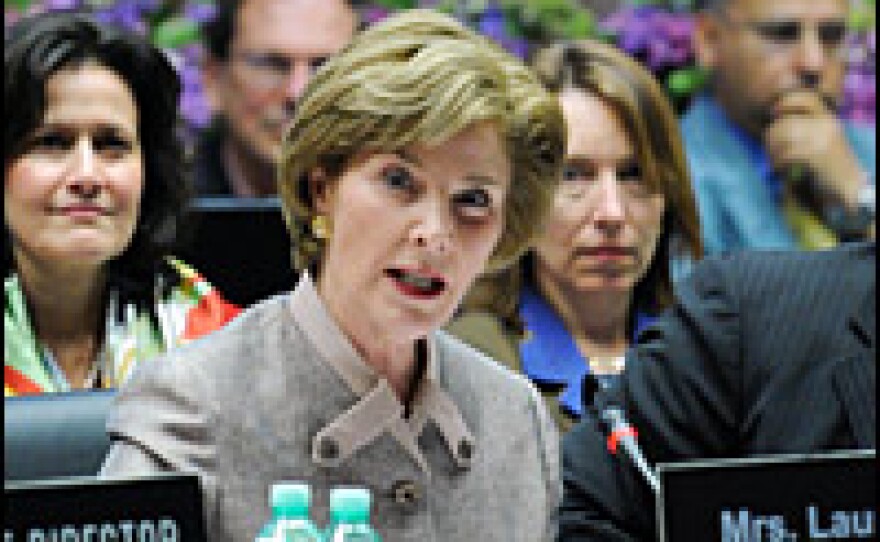In Paris Thursday, donor countries promised to do more to help Afghanistan's fragile government. The U.S. is leading the way, pledging more than $10 billion to help secure and develop the country.
The announcement was made by Laura Bush, a first lady who has long shown interest in women's issues in Afghanistan — and is now an even more public figure on that and other foreign policy matters.
President George W. Bush clearly didn't keep the promise his wife says she got before they were married — that she wouldn't have to make any speeches. On Thursday, she made two: She addressed the U.N.'s World Food Program in Rome and was the U.S. headliner at the Afghan donor's conference in Paris.
"Afghanistan has reached a decisive moment for its future," Bush said. "We must not turn our backs on this opportunity."
Her speech came just days after her solo trip to Afghanistan, where she toured U.S. projects and was greeted in Bamiyan province by NATO troops from New Zealand.
The first lady has made forays into foreign policy before — taking trips to Africa to highlight the Bush administration's HIV/AIDS programs and to the Middle East to raise awareness about breast cancer.
She got some flak when she posed for pictures wearing a black headscarf and abaya in Saudi Arabia. There were also some who criticized her for bringing in foreign policy disputes when she briefed the media after a cyclone tore through Myanmar, also known as Burma, in May.
"The response to the cyclone is just the most recent example of the junta's failure to meet its people's basic needs. The regime has dismantled systems of agriculture, education and health care. This once wealthy nation now has the lowest per capita GDP in Southeast Asia," Bush said at the time.
Though Myanmar limited U.S. aid to cyclone victims, a White House Asia expert in the first term of the Bush administration, Michael Green, said he wouldn't blame Laura Bush's tough talk.
"There's not one iota of evidence that the regime closed up or resisted help because she said it. Quite the opposite: I think it raised the issue so that governments around the world were more focused on pressuring the regime to do the right thing," he said.
Green, who is now with the Center for Strategic and International Studies, said he has seen the first lady take on a much more high-profile role on foreign policy issues during the second term. He said he suspects she is feeling more confident and well-briefed.
"I wonder if part of it also is that she's speaking a bit more as the conscience of the administration at a time when, for a variety of reasons, our foreign policy is becoming a little less ambitious, a little less transformative and less focused on some of the human rights and democracy issues that were so pronounced a few years ago," he said.
It was apparently Elsie Walker, one of President Bush's cousins and an expert on mountain peoples, who got Laura Bush interested in Burmese opposition figure Aung San Suu Kyi.
Green said Myanmar and Tibet are non-controversial issues for the first lady.
"Support for the Dalai Lama, support for Aung San Suu Kyi [are] pretty bipartisan. So she's been careful not to choose issues that would be politically contentious at home," he says.
The former librarian has certainly played it safe, said Myra Gutin, a first lady historian at New Jersey's Rider University and author of the book Barbara Bush: Presidential Matriarch.
Like her mother-in-law, Laura Bush has a "good antenna and she looks at things in terms of what the costs might be if she were to blunder," Gutin says.
At this point, Bush has become an asset abroad for an otherwise unpopular administration. Gutin says the first lady's appearance at the donor's conference on Afghanistan is just another sign of that.
"During the mid-term elections of 2006, she was considered the most popular Republican in the country," Gutin says, "so it certainly doesn't hurt to have her out on the hustings, at this conference and in other places, in terms of an historical evaluation of the Bush presidency legacy."
Laura Bush's legacy won't be tied to any one particular issue. Rather, Gutin said, she has taken a more unusual approach, slowly warming up to the limelight and getting more involved in various problems abroad.
Copyright 2022 NPR. To see more, visit https://www.npr.org. 9(MDAzMjM2NDYzMDEyMzc1Njk5NjAxNzY3OQ001))







